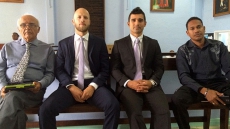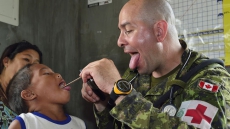MONTREAL — A "devastating" court decision in Quebec against three major Canadian tobacco companies could provide a boost to provinces seeking to recoup health-care costs from tobacco companies.
All Canadian provinces have filed medical cost recovery lawsuits to go after so-called Big Tobacco for health-care costs stemming from smoking-related disease.
The provinces are seeking about $120 billion collectively and Monday's favourable Quebec ruling will reverberate Canada-wide, said Rob Cunningham, a lawyer and senior policy analyst at the Canadian Cancer Society.
On Monday, a Quebec Superior Court Justice awarded more than $15 billion to Quebec smokers who'd filed class-action lawsuits nearly 17 years ago.
Justice Brian Riordan's 276-page ruling dealt what Cunningham called "a massive, devastating victory against the tobacco industry."
All three companies — Imperial Tobacco, Rothmans, Benson & Hedges and JTI-Macdonald — immediately announced their intention to appeal.
"It's the first time in court, in Canada, they've had to defend and be accountable for their actions over decades and the court found they were liable for $15.5 billion," said Cunningham.

The Quebec case was distinct from suits launched by the provinces, but many of the arguments in the cases overlap.
The Quebec action put a mountain of evidence at the provinces' disposal: tens of thousands of pages of documents and testimony heard over more than two years of hearings are available to them.
"The evidence against the tobacco companies in this case and others are similar," Cunnigham said.
No trial dates have been set in those provincial recovery suits, which — unlike in the Quebec case — aim to go after the foreign-based parent companies of the Canadian tobacco firms.
The provinces have been inspired by experiences in the United States, where successful state-sponsored recovery lawsuits saw awards of US$245.5 billion to be paid over 25 years as well as new restrictions on marketing.
As for the rest of the country, there aren't many broad-based class actions like the one in Quebec.
Cunningham said one exception is in British Columbia, where a suit for light and mild cigarettes filed in 2003 has been certified.





